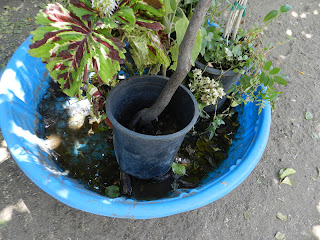This beauty is a curcuma alismatifolia aka Siam Tulip, here is some information on this that I pulled off the internet.
Location
·
Siam Thailand
Soil
·
Keep the Curcuma alismatifolia in
sandy, well-drained soil. If you plant them in pots, make sure that there are
adequate draining holes on the bottom of the planters. Whenever re-potting the
Curcuma alismatifolia, be sure to add the same kind of soil to the new pot that
you had in the old pot.
Watering
·
Water the Curcuma alismatifolia 2 to 3
cups of water every 1 to 2 weeks. When you touch the soil surrounding the
plant, it should be dry, not moist. Never over-water Curcuma alismatifolia, as
it can easily develop fungal diseases. The plant is known to be
drought-tolerant and will not stay healthy in a water-soaked pot.
Fertilizer
·
During the Curcuma alismatifolia's
active growth, feed the plant with a water-soluable 20-20-20 fertilizer approximately
once a month. Stop fertilizing during cooler months. The amount of fertilizer
that you need to use will depend on the type of fertilizer that you purchase,
but make sure you read the directions carefully to avoid harming the foliage
during active growth.
Transplanting
·
Curcuma alismatifolia need to be
transplanted every two or three years, in order to refresh the soil. If the
plant is still growing, you can transplant the Curcuma alismatifolia into a pot
that is one size larger than the old pot. Remember to use a well-drained and
sandy soil.
Rhizomes
·
The Siam Tulip, like other members of
the ginger family,
has thick rhizomes. Every two years, you may want to divide the rhizomes in
order to grow additional, healthy Curcuma Alismatifolia. After removing the
plant's root from the soil, cut its rhizomes into 2 inch pieces. Each rhizome
should have its own roots. Plant the rhizomes in a new pot in the same soil
conditions as the original plant and about 1/2 inch deep into the soil.
Sometimes I am bad at planting things right away. I got this Cassia Tree a couple of months ago and here it still sits in its little pot in a kiddie pool waiting to be planted. One thing I found out is that it likes alot of water, it has almost constantly been in water and seems to love it.
Here is a view of my Cassia Tree so you can see it is still doing fine on top.
My Plumeria flowers
Remember when I planted my Plumeria and Bananas here. Well they are happy as can be.
Another view of Bananas and the Palms.
This is what my front yard is looking like right now. Nice
Farther away view
This is the yard from East to West.
My Potato Tree is happy.
My new plumeria is not happy right not. It still has no roots, but soon it will.
Found a big spider on my Potato Tree, fancy isn't he!?














No comments:
Post a Comment